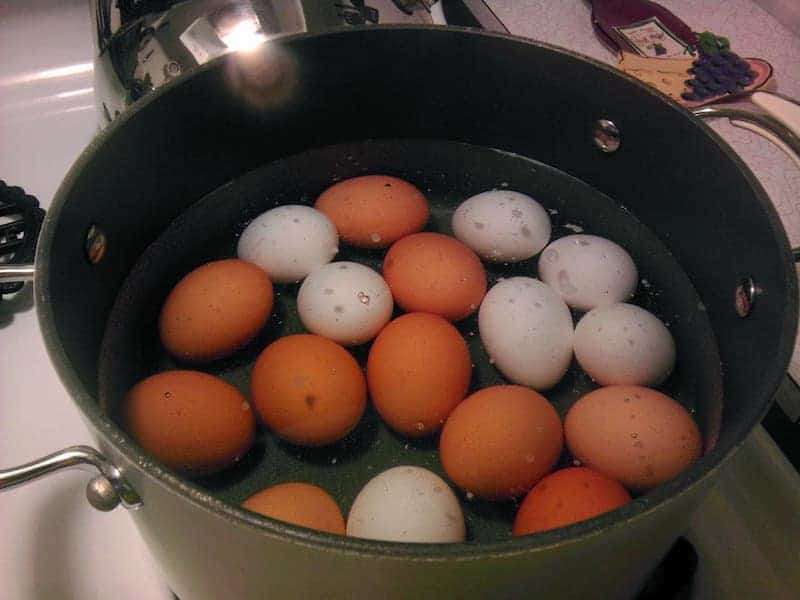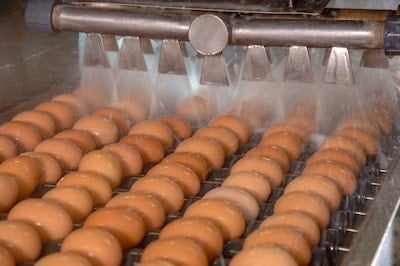Boiling Eggs with Baking Soda: Everything You Need to Know
Boiled eggs are handy for many recipes, and they’re easy to make. Yet sometimes they’re annoyingly difficult to peel, and how exasperating that can be!
In addition, when the white of the egg doesn’t come away easily from the shell, the eggs may look ragged and unattractive. That’s incredibly frustrating when planning a party dish, such as a tray of deviled eggs.
One way to ensure that the shells will separate easily and smoothly from the eggs is to add baking soda to the water when the eggs are cooked. Why is that?
Read on to learn more about making boiled eggs with baking soda.
What Does Baking Soda Do When Boiling Eggs?
Adding baking soda to the water when hard-boiling eggs can help make them easier to peel after they’re cooked.
Baking soda does this by reducing the acidity of the eggs. This softens and relaxes the membrane between the shell and the proteins in the egg white.
As a result, the membrane begins to detach and doesn’t hold so stubbornly when the egg is peeled.
When the eggs are stored, the membrane softens naturally, so eggs laid 7 to 10 days before being cooked are easier to peel than fresher eggs.
However, it’s not always possible to wait, so if fresh eggs are to be hard-boiled, adding baking soda to the water can boost easier peeling.
Even if the eggs have been stored, adding baking soda is an easy step to help ensure easy peeling.
Anything that results in smooth, shiny egg whites and less frustration is not to be skipped—no harm, and possible benefit
Do You Add Baking Powder Or Baking Soda When Boiling Eggs?
Use baking soda, not baking powder, when boiling eggs.
Baking soda has just one ingredient, a single chemical otherwise known as sodium bicarbonate.
Baking powder does contain baking soda, but it also has other ingredients—cream of tartar, cornstarch, and sometimes aluminum in the form of sodium aluminum phosphate or sodium aluminum sulfate.
Since baking powder is only about ⅓ baking soda, you’d need to add three times as much baking powder, or up to 1 ½ teaspoons, to the cooking water to get the same effect as ½ teaspoon baking soda.
However, using this much baking powder could leave a metallic taste in the eggs due to the aluminum.
How Much Baking Soda Do You Need to Make Hard-Boiled Eggs?
The amount of baking soda to add when boiling eggs depends on how much water you’re using and the number of eggs you are cooking.
Generally speaking, add ½ teaspoon of baking soda per quart of water you are using to boil the eggs.
So, for the average home kitchen, use ¼ to ½ teaspoon of baking soda per batch of eggs cooked.
How To Make Hard-Boiled Eggs Easy to Peel with Baking Soda
To help make soft and hard-boiled eggs easier to peel, add ½ teaspoon baking soda to the water before cooking.
The baking soda raises the pH of the water (and the eggs), making them easier to peel.
Tips For Boiling Eggs With Baking Soda
Here are some tips for perfect, easy-peel boiled eggs with baking soda.
Take the Eggs Out of the Fridge for An Hour Before Cooking
Taking the eggs out of the fridge beforehand brings them up to room temperature.
Eggs that are cold from the refrigerator will be shocked by the hot water, forcing their moisture to rapidly expand and making the eggs more likely to crack during boiling.
The temperature shock may also cause the egg white to become attached to the shell, making the boiled egg more difficult to peel.
Room temperature eggs cook more consistently, without cracking, and are more likely to be easier to peel.
An added tip: boil the eggs with boiling water rather than from cold water.
Use Old Eggs
Old eggs (eggs that were laid 7-10 days ago) are easier to peel. This is because the inner membrane inside the eggs dries and contracts slightly over time, pulling away from the shell and making it easier to peel.
Older eggs are also less acidic, which promotes easier peeling.
Adding baking soda to the water reduces that acidity, making fresh eggs peel more like old eggs.
Use an Ice Water Bath
After boiling your eggs, immediately immerse them in an ice-water bath. Plunging the eggs into water that is as cold as possible makes boiled eggs better in many ways:
- Stops cooking. Boiled eggs can take a long time to cool down by themselves, and the egg’s interior can continue cooking that whole time. This leads to overcooked eggs and boiled eggs with rubbery whites and a green or gray ring around the yolk.
- Promotes peeling. The temperature shock of an ice water bath forces the membrane and the white inside the egg to rapidly contract, separating the inner membrane and the egg white from the shell.
- Makes the eggs easier to handle. The ice bath makes the eggs cool to the touch more quickly, making them easier to handle, use, and cook with. Eggs that have been cooled in ice water can also be safely refrigerated without raising the temperature of your refrigerator.
Peel the Eggs Once Cooled
Boiled eggs are easiest to peel right away after being cooked and cooled. However, allowing boiled eggs to stay unpeeled for a day or two promotes re-attachment between the egg white and the shell, so it’s best to peel your boiled eggs soon and then store them in the refrigerator in an airtight container.
In Summary
Perhaps every cook can identify with the struggle of peeling boiled eggs to achieve the beautifully smooth egg whites perfect for a party platter or other festive dish.
All the tips and tricks people have devised are called upon to ease the exasperation of bits of egg white clinging stubbornly to their shells.
Adding baking soda to the water when cooking those eggs can alleviate frustration and increase success. Vinegar is another way to make this easier – click here to learn more.







